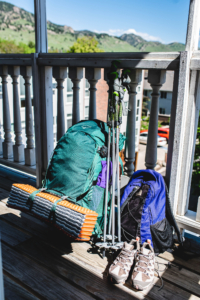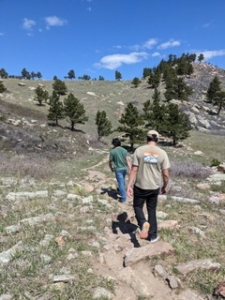The Power of Giving Thanks
 “In positive psychology research, gratitude is strongly and consistently associated with greater happiness,” according to Harvard University’s Health Beat. “Gratitude helps people feel more positive emotions, relish good experiences, improve their health, deal with adversity, and build strong relationships.”
“In positive psychology research, gratitude is strongly and consistently associated with greater happiness,” according to Harvard University’s Health Beat. “Gratitude helps people feel more positive emotions, relish good experiences, improve their health, deal with adversity, and build strong relationships.”
Gratitude is a thankful appreciation for what an individual receives. “With gratitude, people acknowledge the goodness in their lives. In the process, people usually recognize that the source of that goodness lies at least partially outside themselves. As a result, being grateful also helps people connect to something larger than themselves as individuals — whether to other people, nature, or a higher power.”
In a 2021 article for PsychCentral, Andrea Rice explained how one can “rewire” the brain for positive thinking with “mature gratitude” and reap the benefits of developing your own practice.
“Neuroplasticity is the brain’s ability to form new neural connections. This ‘rewiring’ effect can lead to positive growth and change. When the brain’s circuits get caught up in negative narratives, your thoughts might skew toward the negative.”
The negativity bias is our tendency to be more attracted to negative stimuli than positive but it is possible to move beyond that negativity bias and pay more attention to the positive aspects of life.
Negative thinking can be deliberately countered with a “mature gratitude practice that includes kindness, being thankful for life, and a higher power,” Rice suggested. Research shows that practicing gratitude can be good for heart health and inspire happiness, satisfaction, and general well-being.
“Cultivating an attitude of mature gratitude through actions of kindness, expressing being thankful for life and God, and enjoying all the small things in life helps in coping with the current threats of COVID-19 and building lifelong resilience for the future,” Lilian Jans-Beken wrote in her study on mature gratitude in 2021 during the global pandemic.
Rice suggested a number of ways you can practice gratitude depending on what works best for you. “You might practice gratitude first thing in the morning or just before bed at night. If you’re busy, your commute to work might be an ideal time for reflection.”
Here are a few other ideas to consider:
- gratitude journaling and writing
- expressing what you’re thankful for on social media
- sending someone a text to let them know you appreciate them
- writing down three things that you’re grateful for
- creating a collage of all the things that you’re grateful for
Gratitude practice can also have a positive impact on people with schizophrenia and other serious mental illnesses. In 2017, Miran Jung and Kuemsun Han explored the “effectiveness of gratitude disposition promotion program on depression and quality of life of chronic schizophrenic patients.”
They noted that about 80 percent of schizophrenic patients experience depression, and 20–50 percent attempt suicide in an acute psychotic state or in a chronic depressive state.
“Depression, among the many factors affecting the quality of life of schizophrenic patients, has a great influence on the subjective quality of life,” they wrote. They found that gratitude intervention is effective in reducing depression and improving the quality of life in schizophrenic patients.
“In this study, we newly developed a gratitude disposition promotion program for promoting gratitude disposition, reducing depression, and improving quality of life of chronic schizophrenic patients in community and verified its effect,” the authors concluded. “The study results indicated that gratitude disposition promotion program was a useful intervention to raise the gratitude disposition and quality of life of chronic schizophrenic patients in community.”
“Remember that gratitude is a practice—not a quick fix,” Rice reminded her readers. “Taking the time each day to reflect, be mindful, and savor the positive stories and experiences all around us can help rewire the brain for positive thinking.”
Colorado Recovery has emphasized the importance of compassion, respect, and social connections in its groundbreaking approach to mental health treatment for many years. The treatment model developed by our founder Richard Warner is based on a warmer and more human familial setting, comprehensive levels of care that result in a path of self-reliance, and community engagement for connection and a feeling of contribution.
The treatment program at Colorado Recovery aims to empower adults with mental illness, and those who support them, with an unrelenting optimism for recovery, purposeful involvement in the community, and an enhanced sense of meaning in life.
Our treatment facility provides the services needed to address schizophrenia, bipolar disorder, and other serious mental illnesses which are specific to each individual. Call us at 720-218-4068 to discuss treatment options for you or the person you would like to help.

 Being in nature can boost your mood and improve your mental health. Spending quality time in the great outdoors reduces stress, calms anxiety, and can lead to a lower risk of depression, according to a 2015 study by researchers at
Being in nature can boost your mood and improve your mental health. Spending quality time in the great outdoors reduces stress, calms anxiety, and can lead to a lower risk of depression, according to a 2015 study by researchers at  Nature can improve mental health and sharpen our cognition. “From a stroll through a city park to a day spent hiking in the wilderness, exposure to nature has been linked to a host of benefits, including improved attention, lower stress, better mood, reduced risk of psychiatric disorders, and even upticks in empathy and cooperation,” wrote Kirsten Weir on the website of the
Nature can improve mental health and sharpen our cognition. “From a stroll through a city park to a day spent hiking in the wilderness, exposure to nature has been linked to a host of benefits, including improved attention, lower stress, better mood, reduced risk of psychiatric disorders, and even upticks in empathy and cooperation,” wrote Kirsten Weir on the website of the  Clients even get to make arrangements to hike with their peers without Colorado Recovery staff coming along. “I think that’s huge for them,” says Kamback. “All the benefits of nature while being more present and calm gives them a little more confidence to interact with others.”
Clients even get to make arrangements to hike with their peers without Colorado Recovery staff coming along. “I think that’s huge for them,” says Kamback. “All the benefits of nature while being more present and calm gives them a little more confidence to interact with others.”
